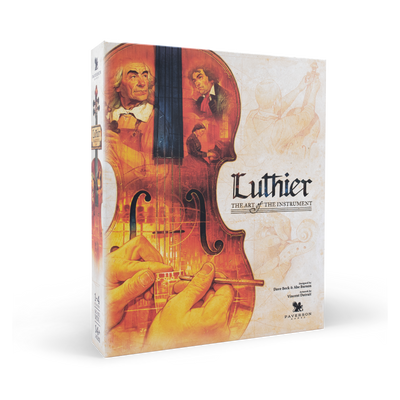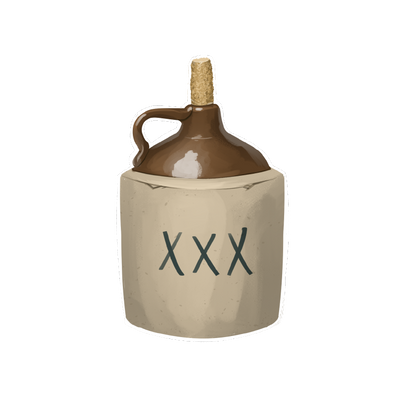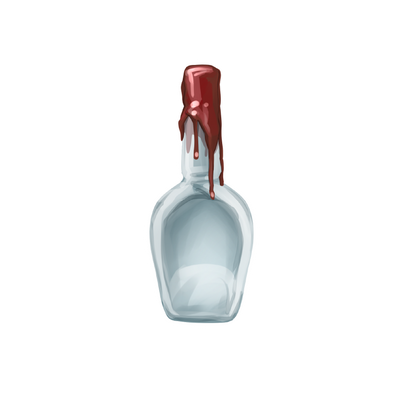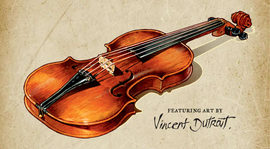Back in September of 2019 – three years ago nearly to the day – I would have laughed if you had told me that the game about whisky I was working on would become a reality. Furthermore, I would have told you to GO HOME if you also said that I had a publishing company and we’d be announcing a SECOND game as well! Well, here we are, three years later, and I’m absolutely thrilled to announce our next title from Paverson Games.
Staying strong to our interest in a hearty blend of both mechanics and theme, and pivoting from one sophisticated pastime to the next, we are turning our focus from fine whiskies to classical music! I’m jazzed to introduce to you Paverson Games’ next title, Luthier: The Art of the Instrument. The game is co-designed by myself and Abraham Burson, with heavy game development by Richard Woods, who served a similarly strong role in Distilled.

Luthier puts you in the seat of one of the many different famous luthiers and instrument makers from 18th century Europe (such as Stradivari, below), crafting various musical instruments for famous composers, nobles, and performers. Here’s the official game overview:
Luthier transports players back to the height of classical music in Western Europe, where the art of the instrument was upheld equally by skilled craftspeople, noble patrons, virtuoso performers, and famous composers such as Bach, Beethoven, and Mozart.
Using a new, unique combination of hidden bidding and worker placement, players will manage resources to craft various musical instruments in their workshop, while also constantly courting patrons through an ever-changing personal tableau of actions and bonuses.
Each player will choose how to balance improving one’s skills across multiple tracks that will unlock specialized worker abilities. Concentrate on strategic focus areas such as a variety of musical performances, instrument building and repairs, apprentice training and workshop expansion, and overall reputation as an instrument maker.
Luthier finds true harmony through an authentic and original marriage of theme and mechanics, resulting in a rich gameplay experience that equally speaks to both the strategic gamer and the classical music lover.
How did we get this point, you might be wondering? At the very first Protospiel that I took Distilled to (January 2020), I met Abraham Burson. Abe had a little game called Luthier that he had been working on. I had a chance to play it, and immediately was intrigued by three things that stuck with me long after that snowy January weekend:
- His focus on theme was extremely strong. I could tell that he knew about instruments, luthiery, and overall attention to detail around music and musical instruments, based on his experience as a musician himself
- His game and my game were quite similar – play as a craftsperson, get resources, craft that thing, and get points and money. Where mine was a deck builder (at the time), his wasn’t. His was something entirely different, which was the most important thing that stuck out…
- Luthier’s key mechanic combined worker placement with hidden bidding, and it immediately intrigued me as something I’d never seen before in a game.
After we played both of our games, we decided to keep in touch (just as the pandemic was starting to emerge). Over the past couple of years, we have both had a chance to return to Luthier and Distilled, providing playtesting feedback for each other. It was during this time I learned that Abe had actually been working on Luthier for over 10 years, since way back in 2009, with heavy revisions and implementation ramping up in 2018. Abe even took it to Stonemaier Design Day in 2019 (a cool event Jamey Stegmaier hosts in St. Louis for prototypes and unpublished games), where it was one point shy of making the coveted “top ten” most popular games list at the event.
Fast-forward to this year, and I knew it was time to start thinking about Paverson Games’ next title. Distilled was finished and waiting to be translated by various localization partners and eventually be manufactured, and I was itching to get designing again. While I had ideas for both Distilled expansions and an entirely different new game, I also couldn’t stop thinking about Luthier. So, I asked Abe to send me a pitch document and access to his digital prototype, and the rest is history. After signing the contract earlier this year, Richard and I have been building off of Abe’s great foundational mechanics and theme since August, and I’m very happy about the progress we’ve made. I believe we are close to beginning public playtests on our Discord, I can’t wait for you to try it yourself and give us some feedback. I really hope that you can help us to playtest Luthier, much like many of you did for Distilled!
While I know that many of you might have lots of questions (“Let me see photos of the game!” and “How does hidden bidding and worker placement even work as a combination?” and “Who’s the artist?” and “Will you have it to playtest at future cons?” and “When is it coming to Kickstarter?”), that will all come in future posts and updates, both here and on social media. I was just so thrilled to announce it to all of you, as our awesome community, and I wanted you to join us for this ride as soon as possible, just like we did with Distilled.
Luthier will be coming to Kickstarter sometime in the future, and we can’t wait for you to join us on this journey! If you’d like to follow along, please make sure to join our new Luthier Facebook Group, where we’ll be posting updates and playtesting opportunities. We’ll be doing the same through other social media channels, and running many of those playtests online through our Paverson Games Discord.
Finally, if you haven’t yet, be sure to sign up for our monthly Paverson Newsletter. This will allow you to have the inside scoop on conventions, Kickstarter dates, and even some insider bonuses that others might not know about!
Now, on with the show!











